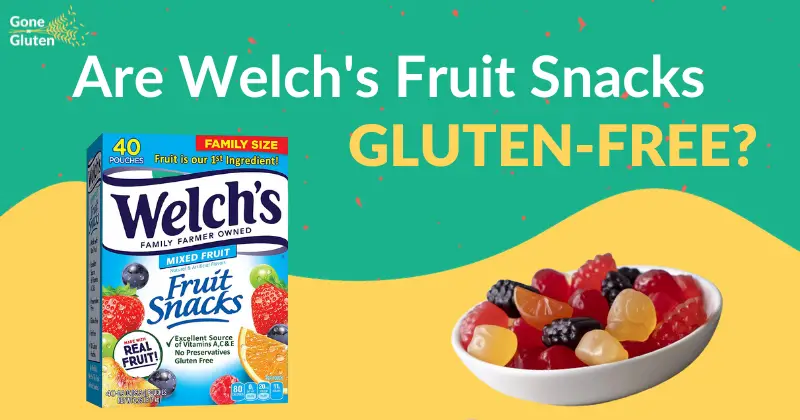Not too long ago, it was rare to see the terms “organic” or “gluten-free” stamped on food products at the grocery store.
Now, grocery stores often have hundreds or even thousands of organic and gluten-free products on their shelves. Does organic mean gluten-free? If not, what’s the difference between the two?
Organic does not mean gluten-free. Although the two diets are often confused, they’re actually quite different from each other. Simply put, organic food contains organically-produced ingredients. Gluten-free food, on the other hand, is food that doesn’t contain gluten, a grain-based protein that some people are sensitive to.
That’s the short answer anyway…
If you’re still confused about the exact difference between organic and gluten-free diets, then this is the post for you! Below, I’ll break down the specifics of both popular diets and explain some of the main reasons why some people choose them. Then, for those interested, I’ll give a few helpful tips for starting a new gluten-free diet.
Are you ready to change the way you eat?

What’s The Difference Between Organic and Gluten-Free Food?
Believe it or not, there was a time when even I didn’t know the difference between organic and gluten-free diets. I knew that there were certain foods that my stomach didn’t exactly like, but I just avoided those foods and tried my best to stay away from them. Like you, I was just another shopper who ignored half of the labels on food products.
However, my digestion issues, headaches, and general nausea only seemed to be growing worse, so I committed to doing some serious research. That’s when I learned about different diets, and specifically about the gluten-free diet (after my doctor told me that I could have a gluten sensitivity).
Above, I explained the main difference between gluten-free and organic foods, namely:
- Gluten-free foods do not contain any gluten, which can cause inflammation and irritation in some people.
- Organic foods are those that have been made or grown to comply with organic farming regulations.
Now, let’s take a closer look at the two.
Organic Food Defined

Once upon a time, pretty much everything was organic. Food was grown out of the earth naturally, processed with minimal additives, and then sold to consumers. Sometime around the mid-20th Century, however, farmers and food companies started using artificial chemicals, additives, and genetic modification to produce higher quantities of food at a lower cost.
Those who had grown up eating organic food knew that something wasn’t quite right. The fruits and vegetables they purchased didn’t taste as good as the ones they remembered. There were more instances of food-borne illness, poisoning from dangerous chemicals, and more. This, in turn, was what led to the organic farming movement in 1940. Pretty cool backstory, right?
Here’s a quick chart comparing organic food to non-organic food:
| Organic Food | Non-Organic Food |
| Doesn’t use genetically-modified ingredients. | Often contains genetically-modified ingredients. |
| Promotes humane conditions for livestock. | Livestock is often overcrowded, sick, and mistreated. |
| Promotes a sustainable environment that contributes to biodiversity. | Non-organic farming often destroys local biodiversity and isn’t sustainable long-term without chemicals and special fertilizers. |
| Pesticides and herbicides aren’t used in organic farming, which can cause more food to be lost (and drive the price up). | Pesticides and herbicides can be used on non-organic crops, resulting in a higher yield (and lower cost). |
Why Do People Eat Organic?

As you can see from the chart above, organic food is considerably different from non-organic food. The main difference is how the food is produced. Organic farming generally contributes to a sustainable farm that provides good conditions for both livestock and farm workers.
Additionally, few chemicals are used in organic foods, many of which can contribute to disease.
So, for some, eating organic is a health-driven choice. People eat organic to limit the harmful chemicals and genetically-modified ingredients that they’re consuming. For others, eating organic is an ethically-driven choice, as organic farms promote humane conditions for livestock and good working conditions for workers.
Gluten-Free Food Defined

Alright, so now that you know a little bit more about organic diets, it’s time to define what a gluten-free diet is. The gluten-free label is regulated by the FDA, and according to their definition, gluten-free food must have “a gluten limit of fewer than 20 parts per million (ppm) for foods that carry the label gluten-free.”
Why the specific number? Well, foods that contain less than 20 ppm of gluten contain so little that the human body can’t detect it and won’t cause a reaction.
Why Do People Eat Gluten-Free?

Gluten is a small protein that is found in grains, such as:
- Wheat.
- Rye.
- Barley.
- Triticale (A cross between rye and wheat grains).
Those who are lucky enough to not be sensitive to gluten may go their entire life without checking a food ingredients label. However, if you take a close look at most processed food labels, you’ll see that they contain gluten. From past and bread to beer and cookies; if it has grain in it, then there’s a 99% chance that it also contains gluten.
Unfortunately, many people (like myself, for example) develop gluten sensitivity. Some are even born with it! When people like us consume gluten, our bodies have an allergic reaction that can cause headaches, nausea, bloating, rashes, swelling, and general discomfort.
Doesn’t sound too fun, does it?
By starting a gluten-free diet, I was able to completely eliminate all of the nasty symptoms I was experiencing. Certain foods are obviously gluten-free, such as veggies, fruits, and meat. However, I’m always extra careful to check the labels when it comes to foods that contain any amount of carbohydrates, as there’s a good chance that they could contain gluten.
Can You Eat Bread On A Gluten-Free Diet?

Traditional wheat-based bread is a big no-no on a gluten-free diet. It’s loaded with gluten! However, many companies produce special gluten-free bread that’s made using gluten-free flour, such as:
- Rice flour.
- Almond flour.
- Quinoa.
- Chickpea flour.
- Coconut flour.
- …and more!
Many gluten-free breads are also organically produced, so you should find plenty of options at your local organic health foods store. That being said, gluten-free bread may not have the same shelf life that you’re used to with traditional bread. So, you’ll need to double-check the dates and learn how to properly store it.
3 Great Tips To Help You Start Your Gluten-Free Diet
Are you interested in starting an organic or gluten-free diet? If so, then here are three awesome tips that will help you stay on track with your diet.
1) Use A Food Journal
If you want to stay motivated and prevent yourself from falling off track, a food journal is a great tool to help you plan meals, remember gluten-free recipes, and keep track of your progress.
2) Stick With Familiar Foods
If you’re just starting a gluten-free diet, try to eat meals that you’re already used to and substitute gluten-free foods. For example, if you like cheeseburgers and pasta, then try substituting gluten-free buns or gluten-free noodles. This will allow you to enjoy your favorite foods and will make the transition easier.
3) Don’t Be Too Hard On Yourself
When I first started my gluten-free diet, I had to learn as I went. I didn’t just magically become an expert overnight. I’ll be the first to admit that I definitely made some mistakes along the way and accidentally ate gluten-containing foods. If you mess up, don’t be too hard on yourself!
Remember, it’s a learning process that often requires a bit of trial and error.
Conclusion
There you have it! By now, you should have a solid understanding of the difference between gluten-free and organic foods. Organic foods are produced in sustainable methods, provide humane environments, and use limited chemicals, while gluten-free foods are designed for people who have a sensitivity or allergy to gluten.
If you’ve been thinking of starting a gluten-free diet but you’re not sure how to, then check out our blog on living a gluten-free lifestyle and start making changes today!




Thank you for your definition between Gluten Free and Organi. Short, Simple and to the point.